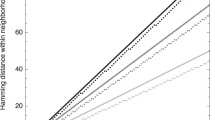Abstract
It is commonly assumed that the ability to track the frequencies of a set of schemata in the evolving population of an infinite population genetic algorithm (IPGA) under different fitness functions will advance efforts to obtain a theory of adaptation for the simple GA. Unfortunately, for IPGAs with long genomes and non-trivial fitness functions there do not currently exist theoretical results that allow such a study. We develop a simple framework for analyzing the dynamics of an infinite population evolutionary algorithm (IPEA). This framework derives its simplicity from its abstract nature. In particular we make no commitment to the data-structure of the genomes, the kind of variation performed, or the number of parents involved in a variation operation. We use this framework to derive abstract conditions under which the dynamics of an IPEA can be coarse-grained. We then use this result to derive concrete conditions under which it becomes computationally feasible to closely approximate the frequencies of a family of schemata of relatively low order over multiple generations, even when the bitstsrings in the evolving population of the IPGA are long.
Preview
Unable to display preview. Download preview PDF.
Similar content being viewed by others
References
Altenberg, L.: The evolution of evolvability in genetic programming. In: Kinnear, J.K.E. (ed.) Advances in Genetic Programming, MIT Press, Cambridge (1994)
Burjorjee, K., Pollack, J.B.: Theme preservation and the evolution of representation. In: Theory of Representation Workshop, GECCO (2005)
Burjorjee, K., Pollack, J.B.: Theme preservation and the evolution of representation. In: IICAI, pp. 1444–1463 (2005)
Burjorjee, K., Pollack, J.B.: A general coarse-graining framework for studying simultaneous inter-population constraints induced by evolutionary operations. In: GECCO 2006. Proceedings of the 8th annual conference on Genetic and evolutionary computation, ACM Press, New York (2006)
Contreras, A.A., Rowe, J.E., Stephens, C.R.: Coarse-graining in genetic algorithms: Some issues and examples. In: Cantú-Paz, E., Foster, J.A., Deb, K., Davis, L., Roy, R., O’Reilly, U.-M., Beyer, H.-G., Kendall, G., Wilson, S.W., Harman, M., Wegener, J., Dasgupta, D., Potter, M.A., Schultz, A., Dowsland, K.A., Jonoska, N., Miller, J., Standish, R.K. (eds.) GECCO 2003. LNCS, vol. 2724, pp. 874–885. Springer, Heidelberg (2003)
Goldberg, D.E.: Genetic Algorithms in Search, Optimization & Machine Learning. Addison-Wesley, Reading, MA (1989)
Holland, J.H.: Adaptation in Natural and Artificial Systems: An Introductory Analysis with Applications to Biology, Control, and Artificial Intelligence. University of Michigan (1975)
Mitchell, M.: An Introduction to Genetic Algorithms. The MIT Press, Cambridge (1996)
Prügel-Bennet, A., Shapiro, J.L.: An analysis of genetic algorithms using statistical mechanics. Phys. Rev. Lett. 72(9), 1305 (1994)
Prügel-Bennett, A., Shapiro, J.L.: The dynamics of a genetic algorithm for the ising spin-glass chain. Physica D 104, 75–114 (1997)
Rattray, M., Shapiro, J.L.: Cumulant dynamics of a population under multiplicative selection, mutation, and drift. Theoretical Population Biology 60, 17–32 (2001)
Rowe, J.E., Vose, M.D., Wright, A.H.: Differentiable coarse graining. Theor. Comput. Sci 361(1), 111–129 (2006)
Shapiro, J.L.: Statistical mechanics theory of genetic algorithms. In: Kallel, L., Naudts, B., Rogers, A. (eds.) Theoretical Aspects of Evolutionary Computing, pp. 87–108. Springer, Heidelberg (2001)
Slatkin, M.: Selection and polygenic characters. PNAS 66(1), 87–93 (1970)
Stephens, C.R., Waelbroeck, H.: Effective degrees of freedom in genetic algorithms and the block hypothesis. In: ICGA, pp. 34–40 (1997)
Stephens, C.R., Zamora, A.: EC theory: A unified viewpoint. In: Cantú-Paz, E., Foster, J.A., Deb, K., Davis, L., Roy, R., O’Reilly, U.-M., Beyer, H.-G., Kendall, G., Wilson, S.W., Harman, M., Wegener, J., Dasgupta, D., Potter, M.A., Schultz, A., Dowsland, K.A., Jonoska, N., Miller, J., Standish, R.K. (eds.) GECCO 2003. LNCS, vol. 2724, Springer, Heidelberg (2003)
Toussaint, M.: The Evolution of Genetic Representations and Modular Neural Adaptation. PhD thesis, Institut fr Neuroinformatik, Ruhr-Universiät-Bochum, Germany (2003)
Toussaint, M.: On the evolution of phenotypic exploration distributions. In: Foundations of Genetic Algorithms 7 (FOGA VII), Morgan Kaufmann, San Francisco (2003)
Vose, M.D.: The simple genetic algorithm: foundations and theory. MIT Press, Cambridge (1999)
Wright, A.H., Vose, M.D., Rowe, J.E.: Implicit parallelism. In: Cantú-Paz, E., Foster, J.A., Deb, K., Davis, L., Roy, R., O’Reilly, U.-M., Beyer, H.-G., Kendall, G., Wilson, S.W., Harman, M., Wegener, J., Dasgupta, D., Potter, M.A., Schultz, A., Dowsland, K.A., Jonoska, N., Miller, J., Standish, R.K. (eds.) GECCO 2003. LNCS, vol. 2724, Springer, Heidelberg (2003)
Author information
Authors and Affiliations
Editor information
Rights and permissions
Copyright information
© 2007 Springer-Verlag Berlin Heidelberg
About this paper
Cite this paper
Burjorjee, K. (2007). Sufficient Conditions for Coarse-Graining Evolutionary Dynamics. In: Stephens, C.R., Toussaint, M., Whitley, D., Stadler, P.F. (eds) Foundations of Genetic Algorithms. FOGA 2007. Lecture Notes in Computer Science, vol 4436. Springer, Berlin, Heidelberg. https://doi.org/10.1007/978-3-540-73482-6_3
Download citation
DOI: https://doi.org/10.1007/978-3-540-73482-6_3
Publisher Name: Springer, Berlin, Heidelberg
Print ISBN: 978-3-540-73479-6
Online ISBN: 978-3-540-73482-6
eBook Packages: Computer ScienceComputer Science (R0)




